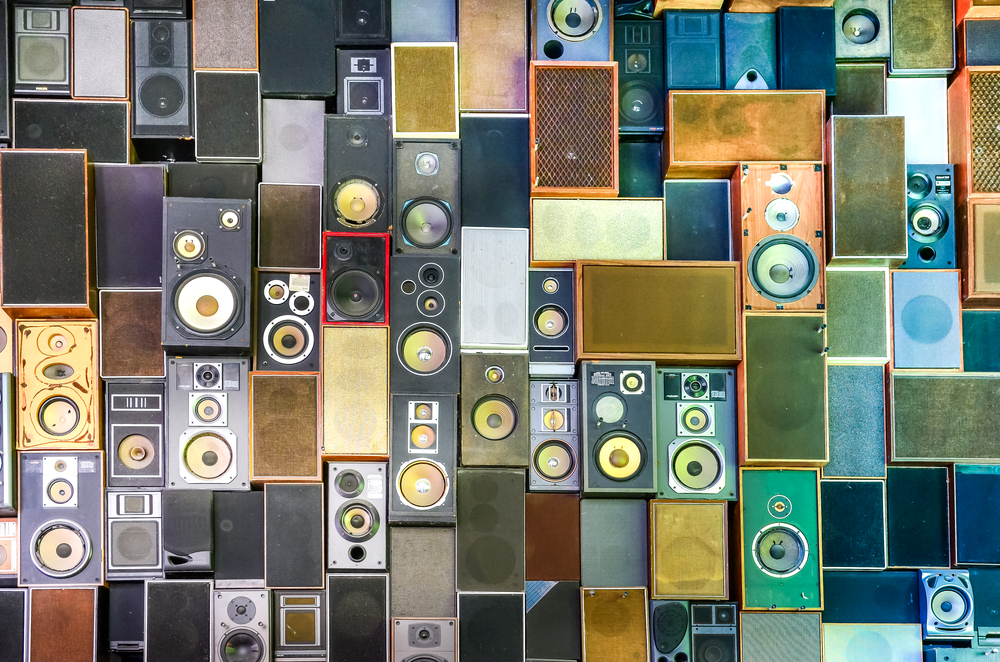Returning to the topic of hearing and listening here with a quick overview of the exhausting chaos that comes with learning to hear.
Amplified.
The initial gift of restored hearing is both joy and misery wrapped with the same bow.
I have a profound hearing impairment which impedes my ability to have normal conversations or hear high frequency sounds. I started wearing hearing aids in my early 30’s. The day I put in my first pair of hearing aids, I drove home in a literal storm of newly un-muted sounds. Previously unheard rain drops now pinged and plucked on the windshield. The turn-signal clicked and the wipers swooshed. My coat made a loud crackling rustle every time my arm brushed my side. The buckle on my leather shoe squeaked.
I got out of the car and heard the crystal blue notes of a songbird. I don’t know when I lost the sound of birdsongs. They simply melted away one day unnoticed. I completely forgotten that birds sing. For several minutes, I stood motionless with my head cocked to one side, dumbfounded by the long-forgotten miracle. I had completely forgotten that birds sing.
Inside the house, wonder quickly turned to bewilderment. Our wood floors creaked like loud creeping skeletons. Plaster walls echoed the bang of toys and thunder of small boys feet. Dropped pans exploded like gun shots. And a clock on the wall ticked mercilessly like a watery drip, drip, drip on my brain every second, every minute, every hour. I became irritable, snappy, short-fused. For the next days and weeks, I tossed and bobbed in an exhausting sea of un-muted sounds.
It’s not easy to suddenly regain what has been lost. Restoration may require a whole lifetime of recalibration.
In the first days of hearing, a whole host of sounds must be mentally catalogued as noise. For example, at first the hiss and hum of a fluorescent ceiling light warrants attention like an alarm. It’s a new sound, after all. But the light bulb is not as important as the little son who is pulling on my sweat pants quietly asking for me to pick him up and hold him. In the larger scheme of listening, the relentlessly ticking clock doesn’t warrant my attention; neither does the squeaking shoe, or the regular click of the furnace. Instead, children’s whispers and door bells gain priority. Eventually an entire raging ocean of small noises is catalogued as background noise. With repetition, the brain begins to recognize and accentuate the sounds that contain meaning.
An exhausting flood of sound is not uncommon with newly amplified hearing. Some people quit using hearing aids because of the annoyance or despair at the start. In my experience, after a first fitting for hearing aids, two important things need to happen. Mechanically, a few follow-up appointments are necessary to tweak the instrument levels and eliminate extreme highs or lows. Physically, the brain has to re-learn how to hear and how to listen. It takes a while to differentiate between what is noise and what has meaning. The mental adjustment takes time.
Learning to Hear
Truth be told, I often miss the quiet. Even now, years later, there are days when the clamor of the world gets especially loud and I take out my hearing aids. Some days the familiarity of being unplugged and alone with my impairment — no matter how isolating and disconnecting — can feel more comforting than the chaos of choosing to hear. I like to sit in the silence and listen to my heartbeat. I feel my lungs inflate with each breath. I remember that I am a spiritual being in a physical body. In the quiet I have space to remember the God of the universe who restores my sanity and teaches me to listen for meaning inside all the noise.
In the process of learning to wade through the noise of a loud world, I’ve learned something important:
The choice to listen is a choice to be connected.
______________________________________________
Resources :


Nice blog, Love this. I choose connection. God is using your impairment, your flaws your glory. I learn so much from Him through your un-muted voice.